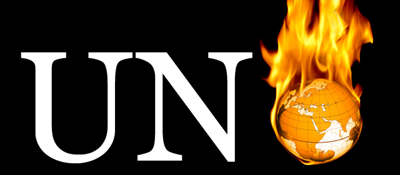Jan 04, 2026
Jan 04, 2026
 Its charter was signed on June 26, 1945, it got established on October 24, 1945, and this year marks the sixty-fifth founding anniversary. After these many years, has the United Nations been a boon or boondoggle? A little bit of both – though overall it has been less beneficial.
Its charter was signed on June 26, 1945, it got established on October 24, 1945, and this year marks the sixty-fifth founding anniversary. After these many years, has the United Nations been a boon or boondoggle? A little bit of both – though overall it has been less beneficial.
Background
The UN has five main components – the Secretariat, the General Assembly, the Security Council, the International Court, and the Economic and Social Council – and oversees seventeen agencies; the famous agencies are FAO, IAEA, ILO, IMF, UNESCO, UNICEF, WFP, WHO, and the World Bank.
Its budget of nearly two billion U.S. dollars is donated mostly by 192 member states. The United States, Japan, and Germany are three top donors. They contributed approximately twenty-two percent, seventeen percent, and nine percent respectively in 2009. China, on the other hand, gave a meager 2.7 percent and was ranked ninth on the donor list, behind the U.K., France, Italy, Canada, and Spain and ahead of tenth-ranked Mexico.
Criticism of the UN
Formed after World War II, the UN is supposed to stop wars and genocides. But it has failed numerous times. It could not prevent mass killings in Cambodia, Rwanda, and Darfur. And presently, it seems ineffective in Kyrgyzstan.
China contributes fund far less than Japan and Germany, yet it has a permanent seat on the Security Council. Why is it so? Why not Japan or Germany or both?
Rightly or wrongly, it lets leaders of nations like Iran and Libya and Venezuela use the UN podium to attack the United States. Furthermore, a member state, involved in a multi-party conflict, may incessantly argue in the General Assembly meetings why others are wrong or why it has a right to do whatever it pleases.
The critics also point out the incidences of corruption and favoritism in the United Nations. The UN Oil-for-Food Program, from 1995 to 2003, allowed Iraq, then under Saddam Hussein, to sell its oil on the world market and use the revenue to buy food and medicine for Iraqis, tells the story of briberies involving UN employees, diplomats, and officials of several nations.
India and the UN
India is one of the top ten contributors of peacekeepers to the UN peacekeeping missions. It has so far lost 127 soldiers, not many for a country of nearly 1200 million people. But for loved ones, one death is too many. They are enduring losses and saying that no cause is worth an Indian life unless it is for Mother India.
Lately, India has been canvassing, more like begging, for a permanent seat on the UN Security Council. But frankly, it looks awkward to ask for a seat when she cannot provide safety and security to her own citizens at home and prevent attacks from foreign terrorists and from indigenous groups like Maoists, ULFA, PLA, and others. Moreover, being on the Security Council is not going to add an iota of security to the homeland.
India need not feel bad about not being on the UN Security Council. Just look at the character of five permanent members sitting on the Security Council: China remains Tibet’s occupier; the U.S. mostly takes Israel’s side; Russia (who has taken over former Soviet Union’s seat) remains a closed society; and the U.K. and France are former occupiers of many nations. Indeed, one doubts if these five are honest brokers or if they could be relied on to solve the world’s quarrels.
India needs to quit the United Nations, period. Go alone, get along, and get ahead.
Alternative to the UN
Surely, the world community needs to prevent future wars and to protect people against a tyrant or tyrannical regime, but the conglomeration of nations called the United Nations is not fit to achieve these goals.
The better choice, to avert frictions or wars or genocides, is to seek either the help of a trustworthy nation or a selfless person of high moral values and integrity like Mahatma Gandhi.